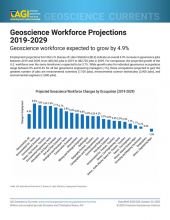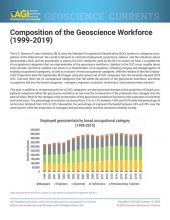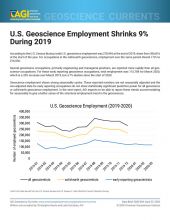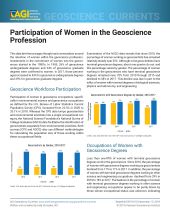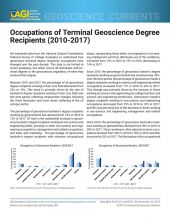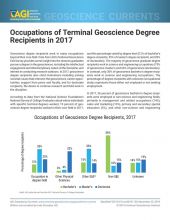Since 1996, the majority of new geoscience Ph.D. graduates have entered into academic positions (both post-doctoral (PD) and non-postdoctoral (non PD)). Of note, is the increase in new geoscience Ph.D. recipients taking academic post-doctoral positions since 2000. This is due to a variety of factors including: 1) the dot-com bust (1999-2001), 2) the increase in federal funding for geoscience research at universities, and 3) the change in Ph.D. job search focus and attitudes about non-academic positions.
Employment sectors of new geoscience Ph.D.s. Source: AGI Geoscience Workforce Program, data derived from the AGI/AGU Survey of New Geoscience PhDs, Class of 2006.
1) The dot-com bust (1999-2001) caused a decrease in job opportunities as markets shrank. As a result of the ensuing recession, more geoscience faculty continued to work later into their careers, delaying retirement. As a result, there were fewer faculty position vacancies in the following years.
2) In 2000, there was a sharp increase of over two hundred million dollars in federal funding for the geosciences, the majority of which was marked for interdisciplinary geoscience research. New Ph.D. graduates during this period were well-positioned for this funding environment. The majority of geoscience Ph.D. dissertations between 1999 and 2000 pertained to either interdisciplinary science (44%) or geological sciences (44%).
3) The majority of new geoscience Ph.D. recipients focus their job search on academic positions, and most (62%) plan to work in academe in the next 10 years. Additionally, geoscience doctoral recipients are more positive about the academic sector than of other employment sectors. Conversely, new geoscience Master’s recipients focus their job searches in the private and government sectors, and most new geoscience Master’s degree recipients plan to work in either the private sector or academe in the next 10 years. Three-quarters of new geoscience Master’s degree recipients find employment within 3 months of job searching, and over eighty percent of new Ph.D. recipients find employment within 6 months of job searching.



